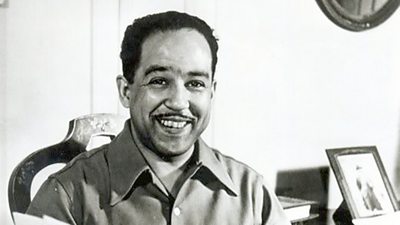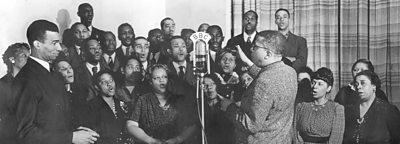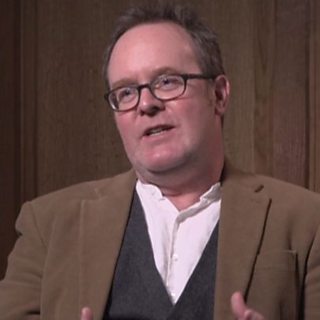African-Americans had appeared on British television screens since the 1930s mostly as entertainers. But there were also remarkable examples of African-Americans getting a leading role in harder-hitting programmes about Civil Rights - and exposing British audiences to the brutal realities of racial prejudice.

There are several instances of racially offensive language in this article.
During the Second World War, ±«Óãtv producers frequently collaborated with American broadcasters, writers, and performers. But perhaps the most striking - and the strangest - collaboration of all was The Man Who Went to War, a "ballad opera" broadcast in 1944 to some 9 million listeners on the ±«Óãtv’s ±«Óãtv Service, as well as several million more via the ±«Óãtv’s European Services and the American military’s own radio network.
This remarkable programme had been conceived jointly by the ±«Óãtv producer Geoffrey Bridson and the great poet of the Harlem Renaissance, Langston Hughes. They’d first met in a New York bar late in 1943, and immediately saw in each other kindred spirits. They both adored jazz and poetry. They both had a taste for progressive social ideas. They both thought of radio as a vital means of communicating such ideas to the general public.
Hughes and Bridson now cooked-up together a programme for the ±«Óãtv that almost certainly could not have been broadcast in racially segregated America at the time. The Man Who Went to War portrayed a family struggling to survive the London Blitz, and their son fighting in the battle-fields of Europe.
But while the narrative was utterly conventional, it’s approach was profoundly political. All the parts were played by African-Americans. The music included spirituals and the blues. The message seemed to be this: that the British struggle against the Nazis was the same as the African-American struggle for freedom in the US - indeed, part of the universal fight against oppression.
The songs were performed by Josh White. Among its starry New York cast was Canada Lee, Ethel Waters - and Paul Robeson, who introduced it on air:
The friendship between Bridson and Hughes endured. And 18 years later, in the spring of 1962, the ±«Óãtv producer got out his tape-recorder at the poet’s Harlem apartment once more for a series of programmes later broadcast on the ±«Óãtv Service.
In these intimate interviews, accompanied by plenty of whisky and cigarettes, Bridson asked Hughes to recall his struggle to earn a living from writing throughout his student years and while working in the bars and hotels of Harlem in the 1920s.
Hughes spoke vividly and eloquently about how, even when escaping America, he had been confronted constantly by racial prejudice:
Two years later, the collaboration reached its high-point. Bridson and Hughes jointly edited an epic nineteen-part series for the ±«Óãtv’s Third Programme, called The Negro in America. The series, spread across the autumn season, offered a kaleidoscopic portrait of African-Americans’ contribution to twentieth century culture - and some raw insights into the Civil Rights struggle that was then rapidly gathering energy.
One of the most gripping programmes in the series focused on the state of African-American writing. In a considerable coup, it featured Langston Hughes chairing a discussion between Le Roi Jones - later known as Amiri Baraka - and James Baldwin, who had just published his celebrated collection of essays about race, The Fire Next Time.
It was recorded following a long hot summer of police violence and angry protest across several American cities - and when the Civil Rights movement there was showing signs of fracturing between those who believed in integration and those who believed that African-Americans should turn their backs on white America and embrace separatism.
Towards the end of the programme, Hughes asked Baldwin for his own thoughts on the matter:
It is significant that the ±«Óãtv broadcast this series when it did. 1964 was a crucial moment in American history - when the Civil Rights protests were approaching what felt like a climax of one sort or another. But 1964 was also a crucial year in British history - a year when racial prejudice on the home front erupted into mainstream culture and mainstream politics.
Just as Bridson and Hughes were making their Third Programme series, ±«Óãtv Television crews were shooting Fable, a Wednesday Play that would eventually be screened in the opening weeks of 1965.
Written by John Hopkins, and starring black actors such as Thomas Baptiste, Rudolph Walker and Carmen Munroe, Fable told the story of Britain under an apartheid regime - though one in which it was black people subjugating whites. It was a scenario which focused uncomfortably on opposition between communities rather than on hopes of integration:
Meanwhile, during the 1964 General Election, there had been a hugely controversial campaign in the West Midlands constituency of Smethwick. Early on, the Labour candidate, Patrick Gordon Walker, had been expected to win. But a campaign slogan was then circulated, which used highly derogatory language: "If you want a nigger for a neighbour, vote Labour".
It was a slogan that his Conservative opponent, Peter Griffiths, had refused to disown. When the polls closed nationwide, there was a swing towards Labour across most of the country, but in Smethwick there had been a dramatic swing in the opposite direction, towards the Conservatives.
Peter Griffiths took the seat. This archive footage of the ±«Óãtv’s election coverage that night shows the moment the result came in:
As the British historian, David Olusoga has suggested, the Smethwick result "demonstrated that race and immigration were issues that could win votes".
The following year, a rattled Labour government brought in its Race Relations Act. One of its Ministers, Maurice Foley, spoke to the ±«Óãtv’s Director-General Hugh Carleton Greene, asking him "about the role broadcasting can play in breaking down barriers".
Within a matter of months, the ±«Óãtv was planning its first regular programmes for immigrants.
Related links
-
Langston Hughes at the Third ±«Óãtv Radio 3 Sunday Feature
-
Great Lives: Paul Robeson ±«Óãtv Radio 4

